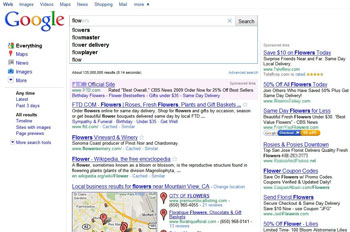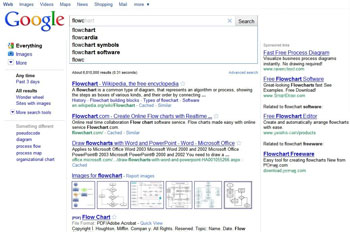With Google’s new feature, “Google Instant,” results are shown and changed as users type in their search queries. As Google explains it on their “Inside Adwords” blog, “For example, if someone types “flow” into Google.com, our algorithms predict that the user is searching for “flowers” (the predicted search) and therefore display both search results and ads for “flowers”. However, if that user then adds the letter “c” to the query, our algorithms may predict that the user is searching for “flowchart” and show the corresponding natural and paid results for flowchart.”
What I was curious about was how does that affect the Adwords accounts, specifically as it relates to impressions, click through rates (CTR), and your quality scores. If your ad is receiving more impressions for something that the user is not looking for it can have a negative impact on your campaign. So, if you were a florist and advertising for the key phrase “Flower Deliveries” your ad could pop-up for someone looking for Flowcharts when they type in “FLOW,” so how would that work with your campaign and impressions.


According to Google’s Inside Adwords blog, you would receive an impression if the user takes an action to choose a query, such as hits enter, clicks on a link, or stops typing for 3 or more seconds.
Google says “it’s possible that this feature may increase or decrease your overall impression levels. However, Google Instant may ultimately improve the quality of your clicks since it helps users type queries that more directly connect them with the answers they need.”
I’m not really sure how this will decrease the overall impressions, but I am very curious to see how a campaign’s impressions and click through rate are affected. At first glance, this seems like a way for Google to boost the number of impressions for their advertisers, lower the click through rates for a campaign and drive down the quality score of an ad so the advertiser needs to pay more for each ad.
I know Google’s Motto is “don’t be evil” but that doesn’t mean that they are still not a company that survives in a capitalistic society. Of course, that’s one way to look at it, I’m not sure how this technology will work in the long run, but I’m definitely going to keep a sharp eye on our client’s campaigns to see what this change does. What are you seeing with your ad campaigns?







5 Responses
“I’m not really sure how this will decrease the overall impressions”
That would happen if your adword strategy is based on long tail keywords, they would be affected by Google Instant search so the the overall impressions would be decreased for these keywords.
So you should change your strategy by paying more attention for short tail keywords and ofcourse paying more money on them :).
The Googles motto should be changed to something like “don’t be naive”!
It was recently reported that Google Instant has skwed data for Google Analytics, I wonder if Google AdWords has had any of the same issues.